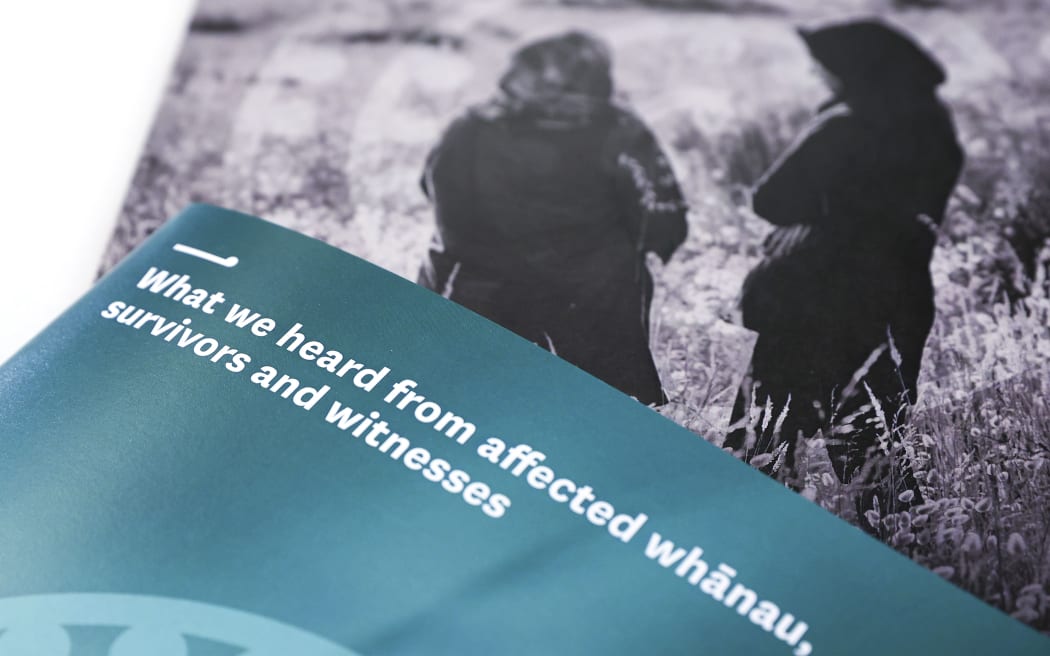
Setting up a reporting system was one of the highest priorities in the Royal Commission of Inquiry's report into the terrorist attack on two Christchurch mosques. Photo: Getty Images / Hagen Hopkins
A landmark threat reporting system for the public to counter terrorism and extremist violence is in limbo.
The outgoing government failed to get a final plan for the new system over the line before the election, as it had intended. It has left it for the incoming government, even though the system is described as key to help security agencies "join-the-dots" about threats.
It was also "one of their highest priorities" of the recommendations from the mosque attacks Royal Commission of Inquiry, but "one of the last" to start.
Four years on from the terrorist attacks that sparked the work, the country still lacks a system the inquiry urged be set up.
The aim is to not only make public threat reporting much easier, but also address what current ministerial documents call "the systemic national security vulnerability inherent in threat information silos that exist between New Zealand government agencies".
Though police rushed through a business case for the system in August, it has since hit a political hurdle. Cabinet took a look but deferred a decision until after the election. This leaves in limbo two of the most crucial matters, that involve "complex human rights implications".
"Cabinet has not made a decision on the range of behaviours and incidents to be reported, or the host agency of the new reporting system," outgoing Police Minister Ginny Andersen told RNZ in a statement on Wednesday.
"These decisions, and the timeline for implementing the business case, will need to be considered by the incoming government."
RNZ asked incoming Prime Minister Christopher Luxon what priority he would put on getting the threat reporting system going, but a spokesperson said National was not in a position to comment until it had formed a government.
Most of the details about the two key matters are blanked out of the ministerial briefings and updates newly and proactively released by police.
These blank out all mention of which agency is likely to host the system; or many details of the exact nature of the public reports the system will accept.
The briefings do say the system aims for the first time to give the public a single contact point in government to report hateful extremism, "targeted mis-disinformation campaigns", religiously and/or ethnically motivated harassment and abuse, racism and "micro-aggressions", where these might not meet the threshold of being a crime that police would tackle.
Officials expect it to get 7000 to 40,000 reports a year, but "the actual number could be many times higher because - as with most crime types - latent demand for extremist harms is likely to be chronically under-reported", a briefing in March said.
"The system will include reports from the public that fall below the threshold of 'concerning behaviour or incidents' and is not limited to crimes or offences."
The privacy commissioner told the police to be careful to calibrate the system to minimise privacy concerns while being effective at identifying people "at risk of carrying out terrorism".
"In particular, police would need to be clear about why they consider that they need to collect information about lower-level types of behaviours, and how this would address the issues identified."
The police-driven business case that cost about $1.4 million, for a system with an initial budget of $13m, was ordered last year but not delivered to Cabinet until August.
The Royal Commission's view was that public reporting "is critical to understanding the full picture of national security threats and risks, particularly in discovering and preventing issues before they materialise into harmful actions", a briefing said.
It could mean for the first time patterns of non-violent behaviour that over time developed into violent extremism could be detected.
"National security incidents may emerge from across a spectrum of concerning behaviours."
The briefings state the spy and security agencies would benefit from the new system improving the "collecting, triaging, and managing information from the public and by providing enhanced information management and intelligence management systems to enable agencies to better 'join the dots'".
Liaison over human rights implications
The Human Rights Commission is also in the thick of it.
"Police is engaging with the Human Rights Commission on the complex human rights implications of the new reporting system," an update this year said.
"These include balancing the right to freedom of expression ... and the protection from over-reporting for certain - especially at-risk - communities.
"Police and HRC will also work together on how they might share information about appropriately responding to advocacy campaigns or vexatious reporting issues."
The Royal Commission strongly faulted security agencies for focusing their threat assessments on members of the Muslim community for years, and ignoring the far-right.
Earlier, Te Puni Kōkiri and the Ministry for Ethnic Affairs said the system had to be "free from racial and ethnic bias".
Justice officials wanted privacy considerations addressed early given that the new system will be receiving reports from the public "that fall below the threshold of suspected crimes".
The briefings do not mention the increasingly powerful and invasive surveillance technologies the various agencies, from police to Immigration, now use more and more. The system will take information-sharing between state agencies with coercive powers a step further. "The success of the reporting system will be dependent on information sharing and responses from a number of agencies," a briefing said.
RNZ has requested the initial privacy impact assessment done on the system. It is not finalised, because the system has not been designed yet.
'Global tensions' driving threats
The Muslim community said setting up a threat reporting system for the public must be a high priority for the new government.
The Federation of Islamic Associations said the country still lacked a badly needed integrated national security system.
"The global tensions will definitely give rise to grievance which will see threat levels increase," said Abdur Razzaq, who worked with the government on its responses to the Royal Commission recommendations.
Without a reporting system, the government's machinery of security might fall back on heavy reliance on the Five Eyes international security network as in the past, he said.
"The voice of communities have no platform."






